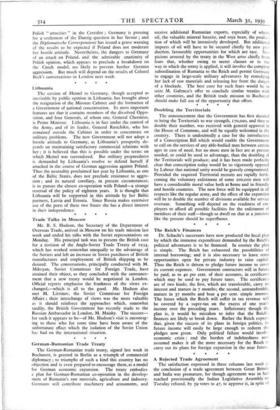German-Rumanian Trade Treaty The German-Rumanian trade treaty, signed last week
in Bucharest, is greeted in Berlin as a triumph of commercial diplomacy ; to triumphs of such a kind this country has no objection and is even prepared to encourage them, as a model for German economic expansion. The treaty embodies a plan for German-Rumanian co-operation in the develop- ment of Rumania's raw materials, agriculture and industry. Germany will contribute machinery and armaments, and receive additional Rumanian exports, especially of wheat, oil, the valuable mineral bauxite, and soya bean, the produc- tion of which will be intensively developed. But additional imports of oil will have to be secured chiefly by new pro- duction, favourable opportunities for which are rare. Sus- picions aroused by the treaty in the West arise chiefly from fears that, whether owing to secret clauses or to the way in which the treaty is applied, it will involve the complete subordination of Rumania to the Reich and permit Germany to engage in large-scale military adventures by remedying her lack of raw materials and releasing her from the danger of a blockade. The best cure for such fears would be to seize M. Gafencu's offer to conclude similar treaties with other countries, and the British trade mission to Bucharest should make full use of the opportunity that


































































 Previous page
Previous page